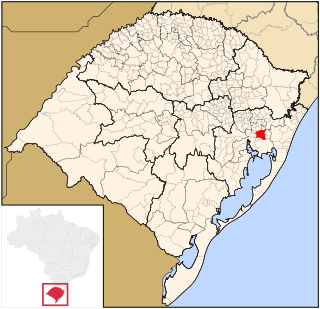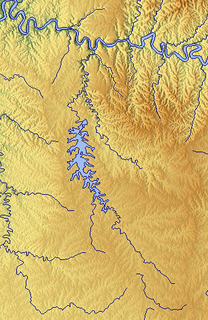
Gravataí is a Brazilian municipality near Porto Alegre at the Rio Grande do Sul State. Its population is approximately 280,000 people, making it the sixth most populous city in the state.

Unisinos is a Brazilian private Jesuit university founded in 1969. Its main campus is located in Southern Brazil, in the city of São Leopoldo, state of Rio Grande do Sul. Unisinos has more than 30,000 students in its 91 undergraduate programs, 19 academic master's programs, 6 professional master's programs, and 14 PhD programs, with six schools – Polytechnic, Business, Law, Health, Creative Industry, and Humanities.

Manoel Viana is a Brazilian municipality in the western part of the state of Rio Grande do Sul. It has a population of 7,307 (2020). Its elevation is 113 m. It has an area of 1,390.7 square kilometers making it one of the largest municipalities in the state. It is located 590 km west of the state capital of Porto Alegre and east of Alegrete. It is the only municipality that is by the Ibicuí River.
Serafina Corrêa is a municipality in the state of Rio Grande do Sul, Brazil.

Ibirapuitã Environmental Protection Area is a protected area in the state of Rio Grande do Sul, Brazil. It is in the Uruguayan savanna ecoregion.

Campos Novos is a city in Santa Catarina, in the Southern Region of Brazil. Campos Novos is a pioneer in production of pollen and the biggest grain and oat producer of Santa Catarina. The municipality invests also into fatstock and poultry farming.
The Aporé River is a river forming the border between Goiás and Mato Grosso do Sul states in central Brazil. It is a tributary of the Paranaíba River, which it enters in the reservoir created by Ilha Solteira Dam on the Paraná River.

The Forqueta River is a river of Rio Grande do Sul state in southern Brazil.
The Ibicuí-Mirim River is a river of Rio Grande do Sul state in southern Brazil. It joins the Toropi River to form the Ibicuí River.
The Ibicuí da Armada River is a river of Rio Grande do Sul state in southern Brazil.
The Ibicuí da Cruz River is a river of Rio Grande do Sul state in southern Brazil.
The Icamaquã River is a river of Rio Grande do Sul state in southern Brazil. It is a tributary of the Uruguay River.
The Ijuí River is a river of Rio Grande do Sul state in southern Brazil. It is a tributary of the Uruguay River.
The Itu River is a river of Rio Grande do Sul state in southern Brazil. It is a tributary of the Ibicuí River, which in turn is a tributary of the Uruguay River.

The Passo Fundo River is a river of Rio Grande do Sul state in southern Brazil. It is a tributary of the Uruguay River.
The Santa Maria River is a river of Rio Grande do Sul state in southern Brazil. It joins the Ibicuí-Mirim River to form the Ibicuí River.
The Santa Rosa River is a river of Rio Grande do Sul state in southern Brazil. It is a tributary of the Uruguay River.
The Toropi River is a river of Rio Grande do Sul state in southern Brazil. It merges with the Ibicuí-Mirim River to form the Ibicuí.







